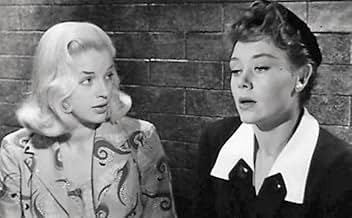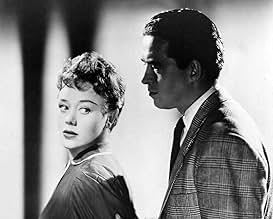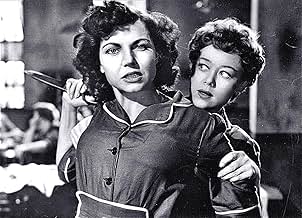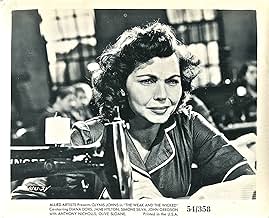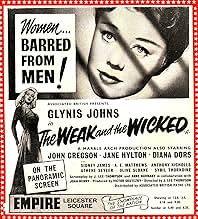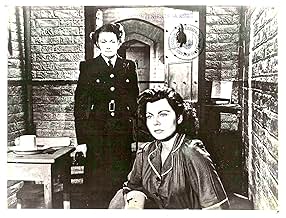IMDb RATING
6.4/10
425
YOUR RATING
Frank "women in prison" story that sympathetically tracks several inmates through their imprisonment and subsequent return to society. Some are successfully rehabilitated; some are not.Frank "women in prison" story that sympathetically tracks several inmates through their imprisonment and subsequent return to society. Some are successfully rehabilitated; some are not.Frank "women in prison" story that sympathetically tracks several inmates through their imprisonment and subsequent return to society. Some are successfully rehabilitated; some are not.
Featured reviews
A peculiar mixture this, with an attempt to portray something of the reality of contemporary womens' prisons on one hand, combined with comedy flashbacks and a fictional approach to crime on the other.
The story centres around Jean Raymond (Glynis Johns) who is the subject of an elaborate frame when she can't pay her gambling debts. In reality, a half competent barrister could have destroyed the case against her, should it have ever come to court in the first place, but here she's sent down for twelve months. There follows her experiences in the grim Blackdown Jail and then The Grange, a progressive 'prison without bars'. Many of the usual clichés of such films are avoided and the staff are shown as being very strict, but fair. One of the comedy episodes features a comical family of shoplifters headed by Sid James and Olive Sloane; Sid's prominent position in the cast list, despite a relatively brief appearance, is notable even at this stage of his career. Another piece of nonsense has a wooden Sybil Thorndike attempting to murder her husband, and then framing Athene Seyler for blackmail. By contrast the scenes in the prison hospital are more realistic, with Jane Hylton giving perhaps the best performance as Babs, haunted by the death of the baby she had neglected. Though third billed, Diana Dors is not very memorable in what is little more than a supporting role. A couple of years or so later she was to give her finest performance for the same director in YIELD TO THE NIGHT.
The finale, with the orchestra in full flow, is as contrived and sentimental as anything that Hollywood could produce. Despite or because of its various eccentricities, I quite enjoyed this.
The story centres around Jean Raymond (Glynis Johns) who is the subject of an elaborate frame when she can't pay her gambling debts. In reality, a half competent barrister could have destroyed the case against her, should it have ever come to court in the first place, but here she's sent down for twelve months. There follows her experiences in the grim Blackdown Jail and then The Grange, a progressive 'prison without bars'. Many of the usual clichés of such films are avoided and the staff are shown as being very strict, but fair. One of the comedy episodes features a comical family of shoplifters headed by Sid James and Olive Sloane; Sid's prominent position in the cast list, despite a relatively brief appearance, is notable even at this stage of his career. Another piece of nonsense has a wooden Sybil Thorndike attempting to murder her husband, and then framing Athene Seyler for blackmail. By contrast the scenes in the prison hospital are more realistic, with Jane Hylton giving perhaps the best performance as Babs, haunted by the death of the baby she had neglected. Though third billed, Diana Dors is not very memorable in what is little more than a supporting role. A couple of years or so later she was to give her finest performance for the same director in YIELD TO THE NIGHT.
The finale, with the orchestra in full flow, is as contrived and sentimental as anything that Hollywood could produce. Despite or because of its various eccentricities, I quite enjoyed this.
Glynis Johns is railroaded into prison for insurance fraud, where she initially despairs. However, the knowledge that her young man is waiting for her and the kindly prison warden buck her up. Eventually she is transferred to a 'prison with bars', where she meets, in the words of Anna Russell, all sorts of terribly interesting people, including Diana Dors and Olive Sloan.
It's directed by J. Lee Thompson from a book by Joan Henry, who was one of his wives; it was based on her prison experiences, and she called the Johns character "a bit goody-goody". Indeed she is. Except for one impassioned speech at the end, she's largely a sounding board for others. She's also rather heavy-set and middle-aged looking to add to her anonymity. Miss Dors gets the better role, and does a good job with it. Thompson would work with her later.
It's directed by J. Lee Thompson from a book by Joan Henry, who was one of his wives; it was based on her prison experiences, and she called the Johns character "a bit goody-goody". Indeed she is. Except for one impassioned speech at the end, she's largely a sounding board for others. She's also rather heavy-set and middle-aged looking to add to her anonymity. Miss Dors gets the better role, and does a good job with it. Thompson would work with her later.
Before he became popular directing Charles Bronson films, J. Lee Thompson directed two prison movies based on books written by his future wife, Joan Henry. Glynis Johns does very well as the gambler who is framed for insurance fraud and sent to prison for one year. Here she meets the inmates who relate their stories of crimes that sent them up for time: a shoplifter, a blackmailer, and a neglectful mother. She stops one from stabbing a cruel guard and is rewarded with a transfer to a prison without walls. It's also very touching in the visitation scenes with her fiancé and doctor (John Gregson) how she feels the stigma of her sentence from the outside world. Only beef with the film I have is that there is no flashback to explain what crime her best friend, Betty (Diana Dors) did to serve two years. Her chum is desperate to find a boyfriend, Norman, that never writes or visits.
I remember seeing this film as a child when it first came out. I disliked it intensely BUT obviously it could not have been as terrible as I thought since I remember it well. I did like both Glynis Johns and Diana Dors. If only these old films were available to us now, I for one would be very happy!!! I remember the cinema where I saw it. It was a 'flea pit' in those days with poor decor and broken seats. The cinema screen was taller than it was wide and the edges were rounded. This was very odd, I thought. I remember that the story dealt with women in prison and followed their misadventures both while 'inside' and after release. I remember being very impressed with Glynis Johns voice and Diana Dors curves. I also remember that the story ended reasonably happy for one but not the other. I was happy when it was over as I had been promised an ice cream for sitting quietly through it!
Aka The Weak and the Wicked. Socialite Jean Raymond is sentenced to 12 months for fraud. In flashback, she is revealed to be in gambling debts and refused to pay. The casino threatens unknown retribution and soon, she is framed for her fraud charge. In prison, she meets other prisoners who reveal their lives before prison in other flashbacks.
I find the prison drama rather rambling and non-dramatic. Some of the characters are interesting and the most interesting parts of the movie are a couple of the flashbacks. The structure of the movie may be problematic in maintaining dramatic drive for the central narrative. All in all, there are a few intriguing bits but the overall effect is less than expected.
I find the prison drama rather rambling and non-dramatic. Some of the characters are interesting and the most interesting parts of the movie are a couple of the flashbacks. The structure of the movie may be problematic in maintaining dramatic drive for the central narrative. All in all, there are a few intriguing bits but the overall effect is less than expected.
Did you know
- TriviaJoan Henry's original novel 'Who Lie In Gaol' was based on her own experiences of prison. In debt from gambling, she took a forged cheque from a friend as a loan, and was convicted at the Old Bailey in 1951. Sentenced to twelve months, she served eight, primarily in Holloway Prison of which she was very critical, and later at Askham Grange Open Prison. The Glynis Johns character is based on her, although Henry thought her "a bit goody-goody".
- GoofsDuring the entire length of her prison term, Diana Dors maintains her artificially bleached and obviously waved hair style; Glynis Johns also maintains a more casual, but still very professionally maintained style from start to finish.
- Quotes
Jean Raymond: No one wants to give a girl with no talent a job.
- ConnectionsFeatured in A Bit of Scarlet (1997)
Details
- Release date
- Country of origin
- Language
- Also known as
- The Weak and the Wicked
- Filming locations
- Wilton Place, Knightsbridge, London, England, UK(dress shop where Jean worked - exterior of The Berkeley Hotel.)
- Production company
- See more company credits at IMDbPro
- Runtime
- 1h 12m(72 min)
- Color
Contribute to this page
Suggest an edit or add missing content

